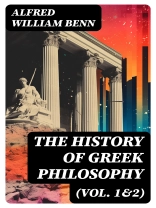In ‘The History of Greek Philosophy (Vol. 1&2)’, Alfred William Benn embarks on an ambitious exploration of the intellectual landscape of ancient Greece, meticulously charting the development of philosophical thought from its inception to the Hellenistic period. Through a critical lens, Benn employs a narrative style that synthesizes comprehensive historical analysis with philosophical rigor, providing readers with an accessible yet profound examination of key figures such as Socrates, Plato, and Aristotle, while situating their contributions within the broader context of cultural and scientific advancements of the time. The work is characterized by its systematic approach, offering insights into the prevailing thoughts and methodologies that shaped Greek philosophy, emerging as a significant reference for both scholarly discourse and general readers alike. Benn, an eminent philosopher and historian, was influenced by the late 19th-century intellectual currents that sought to reconcile philosophy with science and history. His background in both liberal arts and critical theory, as well as his engagement with contemporary philosophical debates, equipped him with a unique perspective that reflects in his writings. This foundation not only informs his meticulous scholarship but also his desire to render complex ideas intelligible to a broader audience. For scholars and enthusiasts of philosophy, ‘The History of Greek Philosophy’ is an indispensable work that illuminates the roots of Western thought. Benn’s thorough analysis encourages readers to engage critically with the foundational ideas of Greek philosophers, fostering a deeper appreciation for their relevance in contemporary discussions. This two-volume set is essential for anyone seeking a comprehensive understanding of where philosophical inquiry began and how it continues to influence modern intellectual landscapes.
Про автора
Alfred William Benn (1843–1915) was a notable British rationalist philosopher and historian of ancient philosophy, particularly remembered for his valuable contributions to the study of Greek philosophy. Benn’s scholarly work often combined a historian’s attention to detail with a philosopher’s quest for depth. His seminal work, ‘The History of Greek Philosophy, ‘ is a comprehensive two-volume series which provides a meticulous account of the early thinkers and the development of philosophical ideas in the Greek world. Through this magnum opus, as well as a range of other influential publications, Benn critically reflects upon the foundations of ethical theories and metaphysical inquiries set forth by the ancients, offering insights that resonate with the rationalist movements of his own time. His literary style is characterized by clarity and precision, aimed at both enlightening the expert and educating the layperson. Benn’s methodological approach combined empirical evidence with speculative reasoning, a hallmark of his broader intellectual project to bridge the gap between scientific inquiry and philosophical discourse. His contributions have been recognized as a robust reference for both the academic study of Hellenic thought and the philosophical evolution of the West.












